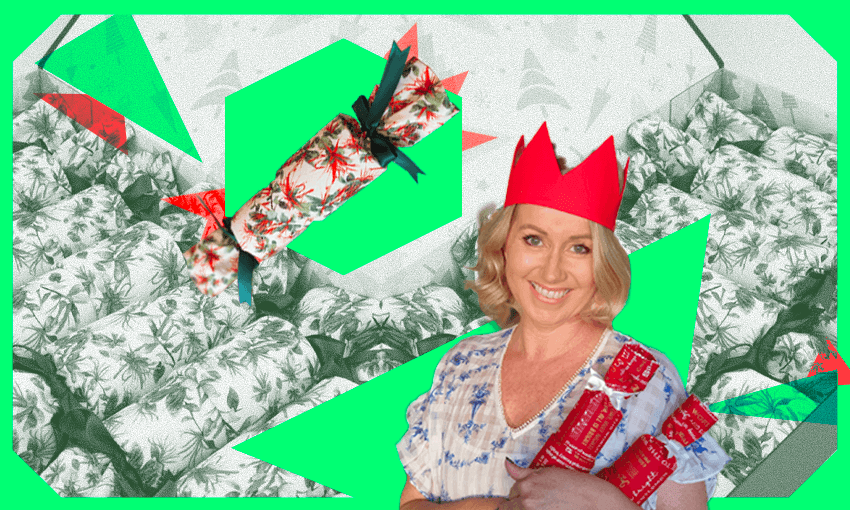Emma Conyngham’s Christmas crackers are reusable, sustainable and, by her own admission, expensive. But right now she’s struggling to keep up with demand.
This is an excerpt from our weekly business newsletter Stocktake.
You get a terrible joke, a silly toy and a hat that breaks immediately. It’s a Christmas Day thrill that lasts just a few seconds before everyone tucks into their festive lunch or dinner. “It’s a tradition we love and adore,” says Emma Conyngham about pulling crackers around the table before a family feast on December 25.
That tradition has one big downside. Those crackers, and their contents, all end up in the bin. “Most of it is not recyclable,” she says. “The piece of plastic is just junk. The hat rips and slides onto your nose within five seconds. How they became a beloved tradition, I don’t know.”
Conyngham is trying to change all that. She’s a big fan of Christmas and all the traditions it brings, but the single-use products and waste the holiday creates clashes with her ethics. “I love Christmas and I want it to continue,” she says. She believes there are plenty of others who feel the same. “People are very sentimental about their traditions, but people are also really over the waste.”
So, in 2020, she launched her first business, Waste Free Celebrations, to address the problem of Christmas rubbish. She offered a range of reusable gift bags – a set of three costs $35 – to help reduce the use of Christmas wrapping paper. News spread quickly of the website she’d built to help family and friends order them. “Within the space of 10 days I had hired 12 women to sew for me to keep up with demand,” she says.
For 2021, she set her sights on creating a reusable Christmas cracker, something to replace the cheap ones everyone buys then biffs. It was harder than it seemed. The fabric wouldn’t fit right. She couldn’t get the correct torque. Conyngham tried dozens of designs. “They all sucked,” she says. “They didn’t look like a cracker. They didn’t sound right. They don’t smell like gunpowder. You need all of that to make the experience the real deal.”
She was staring around her workroom, exasperated, when she spotted a pile of empty cardboard tubes that the fabric for her gift bags comes rolled on. She asked her husband, a builder, to cut them to fit. When she locked them together she had her eureka moment. “I walked into the garage, looked at my husband and said, ‘Pull this’. It had that same grip and pull. I said, ‘I think we’ve done it’.”
An ethical Christmas cracker was born. Released in time for Christmas 2021, the product kicked Conyngham’s ethical gift business into overdrive. Last year, she sold more than half a million dollars worth of product. This year’s looking like much more. Already, still eight weeks out from Christmas, she’s “doing six figures a week,” she says. “Over half our sales are to Australia this year. It’s going great guns.”
Those sales are happening despite the high price point. While packets of normal Christmas crackers usually retail around the $15 mark, Conyngham’s “re-crackers” cost far more. A box comes in packs of four for $100, or eight for $200, including a set of snaps to make the cracker noise. At first, she thought that’d be too much for people. “We were thinking they were so expensive no one would order them, so we put them out for fun,” she says. “Lo and behold, they started selling.”
They haven’t stopped – and it’s not just the crackers that people are ordering. Customers can fill them with their own gifts, or Conyngham sells filler packs with none of the “junk” normally found in a cracker. Her gifts include things like sunscreen, lip balm and Starship donations. “All the items we provide are plastic free and made in New Zealand,” she says.
To keep up with demand, she’s got staff sewing at her Mt Albert house every day. She’s also employed a team of refugee workers sewing from their homes on industrial machines to help out. Someone’s in charge of getting orders out from 8am to 2pm, and even then, they’re still not keeping up with demand. “We’re going hammer and tongs,” she says, “and we’re still falling behind. It’s head down, bum up.”
Soon, Conyngham will open a retail space at the new sustainability-focused Kings Plant Barn in Stonefields, and will make an appearance at Wellington’s Green Expo. She claims she’s not doing any of this to get rich – if she were she’d get her crackers made in China, as many have suggested. “We would make more money but we’d sell our souls,” she says.
Instead, she’s keen to show that business and ethics can co-exist. “You can have an environmentally and a socially responsible product in a business that makes money,” she says. She hopes her crackers become heirloom products that are passed down through generations, just like great grandma’s box of ancient Christmas tree ornaments that come out of the shed once a year. “As long as you keep them dry, there’s no reason they won’t last decades.”
And the trick to winning? Conyngham says it’s all down to which side of the cracker the gift is in. “It’s a surprise. You can’t predict it. That’s half the the fun of it.”



